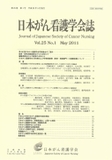Japanese
English
- 販売していません
- Abstract 文献概要
- 参考文献 Reference
要旨
本研究の目的は,神経膠腫の外科的治療後に高次脳機能障害を有した患者の生活の再編成の体験構造を明らかにすることである.初発の神経膠腫の手術後,外来通院中で,みずからの経験を語れる計10名の患者を対象に個別面接調査を行った.生活の再編成を構造的にとらえるため,現象学的アプローチの方法論を基に,A Giorgiの記述的現象学的方法を参考にし分析した.
分析の結果,16の構成要素が得られ,さらに「高次脳機能障害の受け止めと対応」といった視点で4テーマが明らかとなった.生活の再編成の構造は,〈高次脳機能障害を伴う行為により生じた異和感〉を意識し,〈障害を目の当たりにした感情の揺さぶられ〉をともないながら現状を受け止め,さらに,自分なりの〈障害を持っても生きられる術の探究〉により新たな生活のしかたを見出し,これから先のことを現実的に考えだすことによって〈垣間見える将来〉に至るということであった.
神経膠腫の患者は,退院後,特に他者との交流において異和感を感じるが,高次脳機能障害を有したことで,その異和感をすぐに疾患や障害と関連づけて思考することに時間を要し,そのために生活の再編成に難渋するという特徴があった.また,常に再発の不安もいだいており,障害と併せて将来を不確かにしていた.患者が社会の中で孤立せず,主体性ある人生を送るためには,看護師が患者の社会的な人間関係へ一歩踏み込んで人々に理解と支援を働きかける必要がある.
Abstract
The purpose of this study was to determine the structure of the life redesigning experience of patients with neuropsychological disorder after glioma surgery. We conducted individual interviews with ten outpatients whose progress we were observing after surgery of the first glioma. We used A. Giorgi's descriptive phenomenological method to structurally analyze their life redesigning experiences. Analysis revealed 16 components of life redesigning.
From the analysis four themes emerged from the viewpoint of "accepting and coping with the disability." The overall structure of life redesigning was as follows. Patients first became conscious of "a sense of incongruity in their daily life due to their neuropsychological disorder." They then "became aware of their disorder, felt bewildered, and were shaken with emotion." They "searched for a way to live with the disorder" and found a new way of life. They finally "became able to think of the future realistically."
Patients with glioma characteristically feel a sense of incongruity, when interacting with others in their community, after discharge. This neuropsychological disorder makes it difficult to correctly analyze their sense of incongruity. Thus, redesigning their life, within the context of their condition, after discharge is difficult.
Thus it becomes necessary for nurses to seek support and understanding about this neuropsychological disorder directly from family members and others in society key to the patient, so they can facilitate patients' living within their communities.
Copyright © 2011, Japanese Society of Cancer Nursing All rights reserved.


